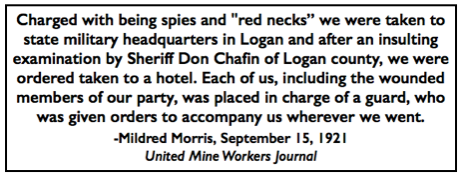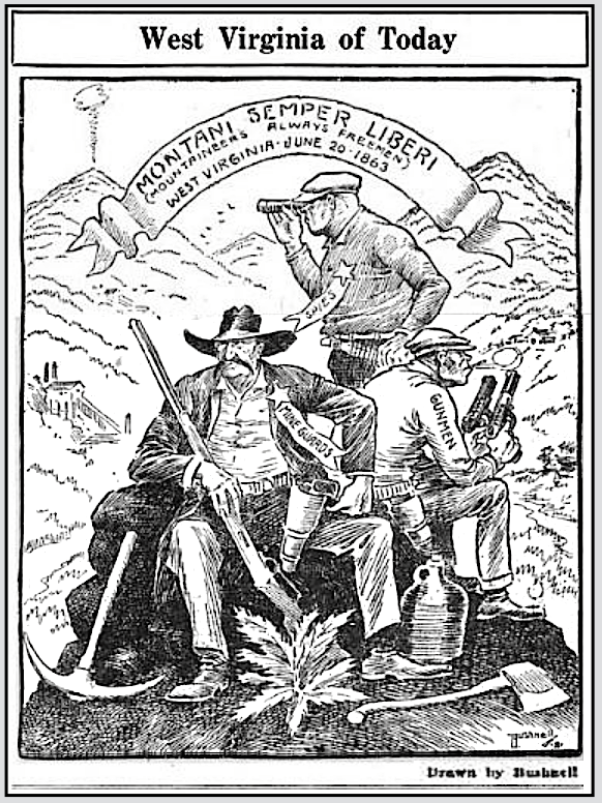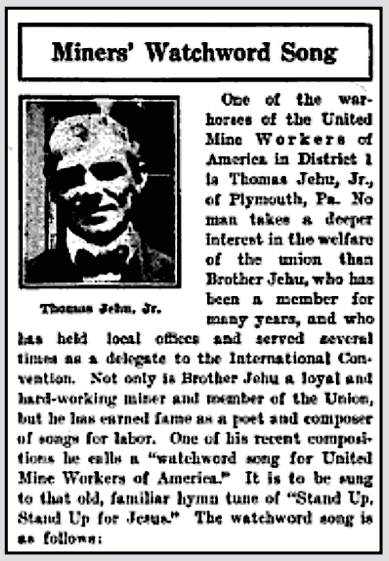 —————
—————
Hellraisers Journal – Friday September 16, 1921
Mildred Morris Describes Her Sojourn into the Battle Zone of West Virginia
From the United Mine Workers Journal of September 15, 1921:
HUNTINGTON , W. Va .– Four newspaper correspondents who have the memorable experience of penetrating the mountainous regions where war between the miners and state police has been raging for nearly two weeks and being the first to obtain an eye-witness picture of the firing line, are alive tonight by the grace of God.
As a member of the party I arrived here after escaping from Logan, where the four of us had been placed under guard.
Under a shower of bullets from both sides we convinced ourselves that war–real war-has been going on in West Virginia.
Three times a fusillade of steel bullets poured on us from the Springfield rifles of the state gunmen and three times we were fired on by the miners.
And after it was all over we were taken with our wounded to Logan, under guard.
Boyden Sparkes, of the New York Tribune, was shot through the leg and a bullet all but penetrated his scalp. One of the miners whom we had persuaded to act as a guide was shot in the ankle and is seriously wounded. When we were able to convince the state police, whose lines we had penetrated, that we were non-combatants merely on a sightseeing tour all military operations ceased while officers stared at us in amazement and asked:
“How in h–-l we had got there and what we meant?”
Military passes we presented from General Bandholtz, representative of the War Department, and commander of the United States troops now in the war zone were scorned.
“We don’t know nothing about him. Nobody has told us federal troops are here and we haven’t seen them, so we don’t know nothing about them,” the young officer in charge informed us.
Charged with being spies and “red necks” we were taken to state military headquarters in Logan and after an insulting examination by Sheriff Don Chafin of Logan county, we were ordered taken to a hotel. Each of us, including the wounded members of our party, was placed in charge of a guard, who was given orders to accompany us wherever we went.
For more than three hours I was subjected to indignities by this guard and other members of the state police.
Only after frantic appeals Mr. Sparkes was permitted to communicate with his office in New York in order that his wife might know he was not seriously injured. None of the rest of us was permitted to establish our identity and our passes from General Bandholtz were received with the same scorn by Sheriff Chafin and his attaches as the officers of the state police on the battle front had shown. My guard, an insolent youth, insisted on going with me into the bedroom assigned to me. When I objected he said he was acting under orders. To avoid this indignity, I was compelled to sit in the hotel lobby while more insolent and youthful members of the state police made insolent queries and threatened me if I refused to answer.
We saw enough on the firing line to take away the impression that the war in West Virginia has not ended. And from what I saw and from what we were told, we left impressed by the horror of the fact that it was not war as civilized nations carry on against each other, but war without mercy, carried on by men lusting for blood. We arrived in Sharples in the center of the fiercest fighting sector at 8 o’clock this morning on board the train which carried the vanguard of the United States troops. The troops brought to impose peace in the name of the United States government were greeted by the roar of machine guns from a height which towers over the settlement and behind which the fiercest fighting in West Virginia’s industrial war has been going on. On top of this almost insurmountable ridge the state police hold positions. In the gullies below are fighting miners. From the western section of Sharples runs Peach creek, whose valley runs between two ridges which rise nearly 2,000 feet. There, we were told, not withstanding the arrival of the troops, and the demobilization of a large party of the miners’ army which occupied its gullies, fierce fighting was still raging.
In a Ford car we proceeded down this valley until it became impassable except on foot.
A beautiful valley with verdant and tree covered ridges. The birds twittered in the trees and bright-colored flowers raised their faces to the sun as the air thundered with the almost continuous boom of rifles and machine guns.
The battle raging might be compared to the battle of the Argonne, we learned. The terrain is like the region in the Argonne with its wooded ridges. There was no sharp division line between the opposing forces. They were mingled, so to speak, sometimes the state police held the position of vantage on the ridge, sometimes the miners.
Led by two miners, whom we met on the way, we were told that on Beech Hilltop, as the crest of the ridge rising to the south is known, we might come upon the firing line of the miners.
Almost exhausted from the steep climb we were proceeding wearily along the path of the summit when suddenly we were fired on. Shot after shot was fired, coming from all sides, it seemed. Our ears cracked with the deafening reports. For a moment we were dazed. We did not realize death-dealing bullets were showering on us. We could see nothing before us but trees. I was a few yards behind my companions. I stood stock still, possessed of a hazy idea that something was exploding. I saw the men in front of me fall flat on the ground. I crouched behind a rock. As the fusillade of bullets continued, I had no terror of the thought of death. At last my woman’s curiosity got the better of me and I raised my head to see what was happening. I could see nothing as the bullets cracked.
Craig of the New York Herald was shouting:
“Don’t shoot us. We are friends. We come unarmed.”
“You are friends and unarmed?” a voice behind a tree shouted back.
“Yes, we are unarmed.”
“For God’s sake stop shooting,” one of the miners cried. But the fusillade of fire continued. I felt a burning sensation on my hand. Afterwards I found a bullet had grazed it.
The firing ended as suddenly as it began.
“Throw up your hands, you —-,” shouted the voice behind the tree.
I saw my men companions rise with hands raised. From behind the trees emerged khaki clad figures with rifles. With an oath we were ordered to the top, where stood an officer with a rifle ready for us.
“Keep your hands up, you —- our guards kept shouting.
It was impossible to walk to the top because of the rocks and trees, so most of us crawled up. I was the last to come.
I saw first Sparkes, his face covered with blood. Jacobs, of the United Press, who was in front of me, had exclaimed at the sight of the blood:
“My God, Sparkes,” and dropped his hands in a move to offer aid to the wounded man.
“Put up your hands,” shouted a sergeant with an oath.
At the sight of me this officer dropped another oath, this time of amazement.
“What in hell, a woman?” he exclaimed.
While he was quizzing us explosive reports came from the other side. The miners were firing. As our captors raised their rifles for action we stood bewildered and again we were under the baptism of fire.
Our captors shouted to us to fall to the and a corporal directed us where to crouch.
In the meantime the young sergeant in charge called on a field telephone at Ethel, state military headquarters, to send automobiles to take away a bunch of “red necks.”
He himself led us down the valley to wait for the automobiles and a young corporal brought up the rear.
There, we were told, notwithstanding the arrival of the troops and the demobilization of a large party of the miners’ army which occupied its gulleys, fierce fighting was still raging.
—————
[Emphasis added.]
~~~~~~~~~~~~~~~~~~~~
SOURCES & IMAGES
United Mine Workers Journal, Volume 32
(Indianapolis, Indiana)
-Jan 1-Dec 15, 1921
Official Publication of the United Mine Workers of America
https://books.google.com/books?id=oHItAQAAMAAJ
-UMWJ of Sept 15, 1921 (381-404/552)
https://play.google.com/books/reader?id=oHItAQAAMAAJ&pg=GBS.RA17-PA1
-pages 4 & 5:
“Newspaper Reporters Fired Upon by State Police”
-by Mildred Morris
https://play.google.com/books/reader?id=oHItAQAAMAAJ&pg=GBS.RA17-PA4
See also:
Tag: Battle of Blair Mountain 1921
https://weneverforget.org/tag/battle-of-blair-mountain-1921/
Search: “Mildred Morris” “staff correspondent”-sept 1921
https://www.newspapers.com/search/#query=%22Mildred+Morris%22+%22staff+correspondent%22&ym=1921-09&sort=facet_year_month_day+asc%2C+score+desc&silo=2
E. A. Bushnell (1872-1939)
https://en.wikipedia.org/wiki/E._A._Bushnell
From UMWJ of Sept 1, 1921 (356-380 /552)
https://play.google.com/books/reader?id=oHItAQAAMAAJ&pg=GBS.RA16-PA1
page 3-Pres Lewis Asks Pres Harding for Conference re Mingo
page 10-Widows Speak re Shooting of Hatfield and Chambers
More from UMWJ of Sept 15, 1921 (381-404/552)
https://play.google.com/books/reader?id=oHItAQAAMAAJ&pg=GBS.RA17-PA1
page 3-Fed Troops Restore Order but Gov Must Disarm Gunthugs
page 7-Brother Dwyer to WV Gov re Gov’s Statement re Pres Lewis
page 8-Truce in Mine War but WV Gunthug System Continues
-long article by Leary of NY World
page 13-Is Anybody Governing WV, repub of editorial from NY World
page 16-Letter re Murder of Hatfield; Stand Behind WV Miners
~~~~~~~~~~~~~~~~~~~~~~~~~~~~~~~~~~~~~~~~
Miners Watchword Song by Thomas Jehu Jr of Plymouth PA
-UMWJ p14, Sept 1, 1921
https://play.google.com/books/reader?id=oHItAQAAMAAJ&pg=GBS.RA16-PA14
Sung to tune of “Stand Up, Stand Up for Jesus”




